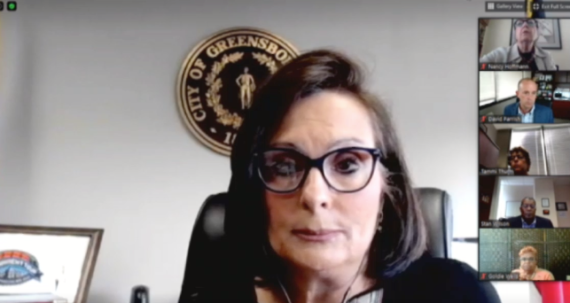The Greensboro City Council has now completely eliminated public comment from its virtual monthly meeting to hear public comment.
In the past, Mayor Nancy Vaughan has at least talked about the comments received. At the virtual meeting on Tuesday, Sept. 1, Vaughan simply noted that comments sent to the City Council would be available on the city’s website on Wednesday.
The public is not given the opportunity to comment virtually but can email comments to the City Council, as they can at any time they so choose.
The first meeting of the month is set up primarily to give the public an opportunity to speak. Before the meetings went virtual in April, the City Council allowed “speakers from the floor” to come to the podium and speak about any issue or concern they chose. A number of people chose to come every week and speak often loudly about topics of concern.
The virtual meetings are set up to allow the public to speak to the City Council at public hearings, and on Tuesday, Sept. 1 there was a resolution honoring the late Billy Eugene Adams. His family, including Rep. Alma Adams who is a former city councilmember, were allowed to speak.
Because the first meeting of the month is designed primarily to conduct a public forum, and no public forum was held, the entire meeting lasted 30 minutes.
The City Council passed the resolution and then passed a short, six item consent agenda made up of items that were routine and noncontroversial. Then each councilmember was given the opportunity to speak and to appoint members to the vast array of boards and commissions that the city has.
Councilmember Sharon Hightower again brought up her concern that some boards and commissioners didn’t have the proper demographic breakdown and requested a work session to go over the boards and commissions, to come up with a process of appointment that would ensure the demographics on each board and commission matched those of the city.
Greensboro is nearly half male and there is only one male on the City Council, but evidently that is not perceived as a problem that needs to be corrected.


The overreaching fascist shutdown of citizens ability to address local leaders is part for the course with the liberty and transparency hating “Mandate Mayor” and her peanut gallery of nonprofit heads and real estate sycophants not saying a word about the lack of open meetings and dismissive heavy handed tactics rountine in the Vaughan regime. We are run by tyrants but not from Washington but rather our Mayor and Governor have usurped and abused their mandates and emergency powers to avoid the will of the people for too long.
What can we do about it? I read this everyday and I’m sure I’m not the only one who Surly disgusted and feels deprived of my rights, voice.
There’s no excuse for them not to do this at the regular venue downtown.
John hammer will endorse her
It’s ok for Alma Adams and family to speak, but not ok for the rest of us. Well that’s certainly fair. And with all we have going on in this city there is still time to recognize yet one more black person for something or other. How about spending time doing something worthwhile. Like cleaning up the streets so drivers and pedestrians can actually see the lane divider lines and turn lane markers instead of big yellow letters proclaiming only segment of the population matters.
Of course she can. She’s better than the public peons.
Reminds you of Nazi Germany. The public was not only not allowed to speak, but were punished for making statements against the regime. Maybe Nancy and Sharon and the bunch are just putting the initial restrictions in place at this time and will expand their power in the near future. Will we have to salute “Heil Nancy?”
This will bite her in the a– come election time.
The summarizing done by the Mayor is unethical to say the least and isnt mentioned in the recommendations. Also, no public comment portion was held on 9/1. By law, you gotta have one every month.
Public Comment Period
Each BOCC must hold at least one public comment period at a regular meeting every month. G.S. 153A-52.1. Each city council must hold at least one public comment period at a regular meeting during any month in which it holds a regular meeting. G.S. 160A-81.1. Obviously, where boards have restricted or prohibited in-person attendance at meetings, people can’t take part in public comment periods in the usual way. It’s a good idea for those boards to offer virtual public comment periods that approximate traditional public comment periods. This view accords with Frayda’s advice in a prior blog post: “If public comments can’t be made in person, perhaps a reasonable accommodation would be to provide a sign up for people to provide their comment by phone call or video, or provide an email option for public to provide written comments.”
Recommendations
Allow people to post comments online or submit them by e-mail or text during the public comment period.
Have the clerk or another official read aloud comments submitted by e-mail or posted online
Nice picture of “Lizzie”. Hope my computer is not damaged.